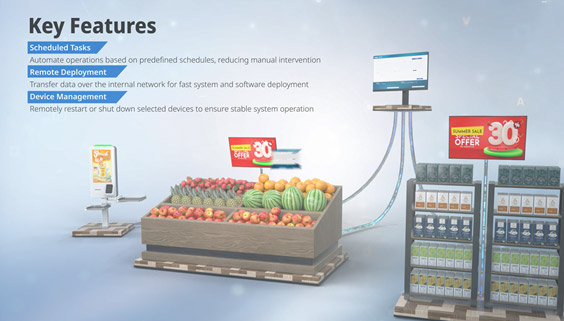


Our custom design process is meticulously structured and validated. We prioritize seamless customer interaction, ensuring accessibility with reasonable NRE costs and flexible project size parameters. In each ODM engagement, our objective extends beyond meeting specifications; we aim to streamline design timelines, minimize costs, and mitigate risks.
Explore further below to discover how we can become the ideal ODM partner you've been seeking.
The advantages of using MSI's DMS include:
Customization
Tailoring embedded boards, systems and touch panel PCs to meet specific requirements ensures compatibility and optimized performance for each project.
Faster Development
Simplifying the design process accelerates project timelines, allowing clients to bring their products to market more quickly.
Reduced Design Risk
Leveraging off-the-shelf products as a foundation for development helps mitigate risks associated with designing components from scratch.
Prototype Delivery
Quick turnaround times for prototypes enable rapid iteration and testing, facilitating the refinement of products before full-scale production.
Scalability
MSI's solutions can be scaled to accommodate various project sizes and requirements, providing flexibility as needs evolve.

Custom Design Process
We specialize in crafting high-quality industrial motherboards and embedded computing systems built to endure and evolve. Our approach is backed by a robust design cycle methodology, meticulously structured to guide every phase of custom design from inception to deployment. Our mission is clear: deliver projects punctually and within budget. We achieve this through a systematic journey, allocating specific timeframes to each stage and implementing checkpoints to prevent schedule delays or budgetary discrepancies.
New Product Development Process
Revision Control & Product Life Cycle Management
At MSI, our core focus revolves around ensuring product availability for extended periods. This commitment is reflected in our meticulous review process for component selection before inclusion in our approved vendor list (AVL). We prioritize reliability to deliver dependable products to our customers for as long as demand and parts permit. Generally speaking, the lifecycle of MSI products span at least 5 to 7 years, often surpassing these estimates based on demand and customer lifecycle requirements at the time of design inception.
Occasionally, product revisions may be necessary due to factors like component obsolescence or regulatory changes. In such instances, we endeavor to notify our customers at least six 6 months in advance. This advance notice allows for discussions regarding available options, such as last-time component buys or suggested component replacements, including detailed explanations of the pros and cons. Our aim is to provide our customers with ample time to make well-informed decisions and plan accordingly.

Software
The customization service provides tailored embedded OS solutions for MSI IPC products, integrating Microsoft Embedded OS, drivers, and customer applications as needed. It also supports HIDAC Utility APIs to enhance system reliability and ease maintenance. Additionally, Syslink offers efficient internal network control for enterprises, enabling seamless remote management and improved operational efficiency.





Manufacturing Capacity
MSI's IPC factory is located in two places, Taoyuan, Taiwan, and Shenzhen, China, allowing customers to choose manufacturing locations based on their needs. Our own factories are capable of producing industrial motherboards, computer-based systems, panel PCs, and providing turn-key contract manufacturing services for our customer-designed PCBAs and system assemblies. Essentially, MSI's production processes adhere to ISO management standards. Throughout the whole production progress, from SMT, DIP, testing and packing, there is a high level of automation.
SMT Process
We have Manufacturing Control System (MCS) to ensures accuracy in material assembly by tracking and verifying materials, also recording crucial DC/LOT information for traceability purposes. It monitors manufacturing steps in real-time, alerting operators to any abnormalities for immediate resolution. Besides, SMT AOI is implemented to cover a range of issues including wrong polarity, missing parts, off pads, and wrong parts, as well as solder defects.

DIP Process
To ensure production quality, we employ an Auto DIP system to prevent the use of inverse parts, wrong components, and mitigate operator errors. Additionally, our DIP AOI is equipped to detect wrong components, missing components, wrong polarity, and parts shift. Following wave soldering, our soldering side AOI addresses soldering bridges, insufficient soldering, and pin visibility issues, while minimizing operator oversights. Our touch-up AOI system further examines for incorrect components, missing components, improper polarity, and parts shift. Finally, post-ICT, our auto screw locking system is deployed to mitigate missing locks, incorrect screws, loose screws, and operator fatigue.

Function test and Packing process
The auto test machine is engineered to boost quality, enhance test efficiency, diminish test misjudgments, and mitigate operator errors arising from test fixture insertion and removal. Following function tests, our packing AOI system is implemented to mitigate customer disputes over cosmetic matters, detect missing and incorrect components, and reduce operator oversights. A specialized CPU AOI stand is dedicated to CPU inspection, addressing CPU socket pin bending and missing pins. Ongoing reliability testing encompasses burn-in, 3D Mark, storage, and vibration tests to ensure exceptional production quality.


Quality Assurance
MSI prioritizes product quality above all else. Apart from its organizational commitment, the Quality Assurance Department stands as a foundational unit within the company. Moreover, the factory has obtained numerous certifications, underscoring its dedication to quality assurance.
Our Shenzhen factory own Management System Certifications including:
- ISO 9001
- ISO 14001
- ISO 14064-1
- ISO 50001
- ISO/IEC 17025
- OHSAS 18001
- QC 080000
- IATF 16949
- TL 9000
- BSCI*
- EICC*
- SA8000* SER*
- VDA 6.3*
* Conditional Pass
